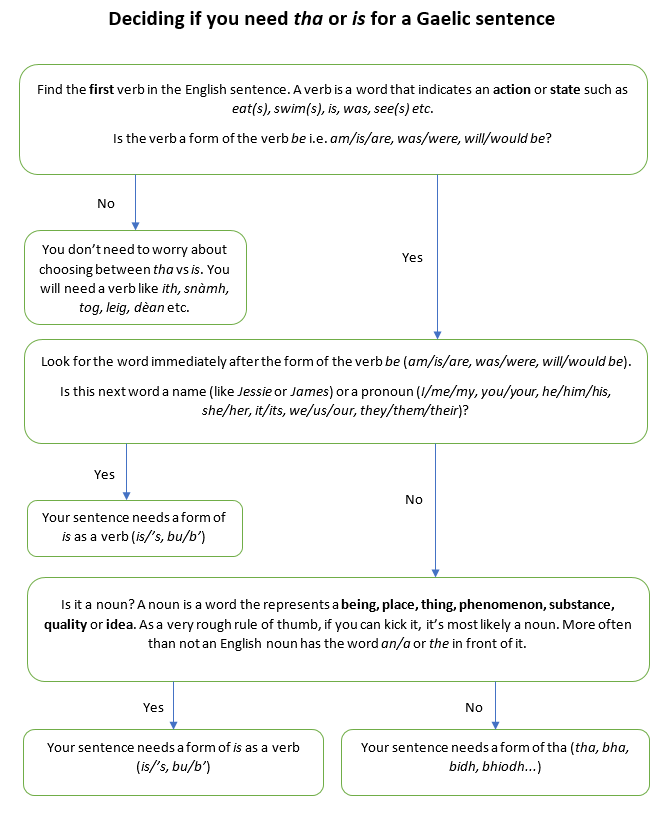An diofar eadar na mùthaidhean a rinneadh air "To bi or not to bi"
(Chaidh duilleag le "So you're tearing your hair a bit over whether to pick <span style="color: #008000;">tha</span> or <span style="color: #008000;">is</span> for a sentence, why..." a chruthachadh) |
|||
| Loidhne 4: | Loidhne 4: | ||
==To business== | ==To business== | ||
| + | It's not actually a hugely difficult rule but there are a few grammatical concepts you need to master before the rule becomes simple and universal. I'll simplify slightly so please no definition nitpickers! | ||
| + | |||
| + | 1. What's a subject? | ||
| + | Well, in the grammatical sense, it's the main actor of a sentence, the thing or person carrying out the main action. It can be a name (e.g. Jamila), a noun (e.g. drongo), a pronoun (e.g. she): | ||
| + | '''Jamila''' went to the shop. | ||
| + | In the absence of the '32, '''Jamie''' decided to open a bottle of the '35. | ||
| + | The flipping '''drongo''' learned how to mimic my alarm clock. | ||
| + | '''She''' is a space pirate. | ||
| + | |||
| + | 2. What's a predicate? | ||
| + | Setting aside the main verb, the predicate is the bit of the sentence that tells you something about the subject. In English, which was [[VSO and Master Yoda|Subject-Verb-Object]] word order, it usually is the bit that comes after the verb. It's what comes after you've answered the question of ''who or what did it?'' and ''did what?'': | ||
| + | Jamila went '''to the shop'''. | ||
| + | In the absence of the '32, Jamie decided '''to open a bottle of the '35'''. | ||
| + | The flipping drongo learned '''how to mimic my alarm clock'''. | ||
| + | She '''is a space pirate'''. | ||
| + | |||
| + | Not hugely difficult, admit it! | ||
| + | |||
| + | ==Yeah but how does that help me?== | ||
| + | Patience, I'm setting the scene for an epic showdown, [insert name] and the Two Verbs. | ||
| + | |||
| + | So when you have verbs like ''learned'', ''decided'' or ''went'', the question of whether you need <span style="color: #008000;">bi</span> or <span style="color: #008000;">is</span> doesn't arise because your main verb will be ''learn'', ''decide'', ''go'' and so on. The conundrum only arises when you run into ''am, are, is, was, were etc''. Don't scoff, this narrows down the number of cases where you have to go hunt for the predicate. | ||
| + | |||
| + | [[Faidhle:tha vs is.png]] | ||
<br /> | <br /> | ||
{{BeaganGramair}} | {{BeaganGramair}} | ||
Mùthadh on 13:49, 17 dhen Ghearran 2021
So you're tearing your hair a bit over whether to pick tha or is for a sentence, why everyone keeps giving you rules that don't quite work and why oh why in the first place should you have to pick?
First off, "why" is a legitimate question if you're curious as to the history. We'll set that aside for now. Why-oh-why does Gaelic need two of these on the other hand is less legit as a question. It's a bit like telling a date you *LOVE* them but they really need to do something about their nose... Their nose is part of what makes them them and if you can't live with the nose, then perhaps your dating for the wrong reasons... So this tha/is (it's technically bi vs is by the way) is just part of what makes Gaelic special. Not the same as French and Spanish. Part of its charm. So learn to live with it or even better, love it.
To business
It's not actually a hugely difficult rule but there are a few grammatical concepts you need to master before the rule becomes simple and universal. I'll simplify slightly so please no definition nitpickers!
1. What's a subject? Well, in the grammatical sense, it's the main actor of a sentence, the thing or person carrying out the main action. It can be a name (e.g. Jamila), a noun (e.g. drongo), a pronoun (e.g. she): Jamila went to the shop. In the absence of the '32, Jamie decided to open a bottle of the '35. The flipping drongo learned how to mimic my alarm clock. She is a space pirate.
2. What's a predicate? Setting aside the main verb, the predicate is the bit of the sentence that tells you something about the subject. In English, which was Subject-Verb-Object word order, it usually is the bit that comes after the verb. It's what comes after you've answered the question of who or what did it? and did what?: Jamila went to the shop. In the absence of the '32, Jamie decided to open a bottle of the '35. The flipping drongo learned how to mimic my alarm clock. She is a space pirate.
Not hugely difficult, admit it!
Yeah but how does that help me?
Patience, I'm setting the scene for an epic showdown, [insert name] and the Two Verbs.
So when you have verbs like learned, decided or went, the question of whether you need bi or is doesn't arise because your main verb will be learn, decide, go and so on. The conundrum only arises when you run into am, are, is, was, were etc. Don't scoff, this narrows down the number of cases where you have to go hunt for the predicate.
| Beagan gràmair | ||||||||||||
| ᚛ Pronunciation - Phonetics - Phonology - Morphology - Tense - Syntax - Corpus - Registers - Dialects - History - Terms and abbreviations ᚜ | ||||||||||||
